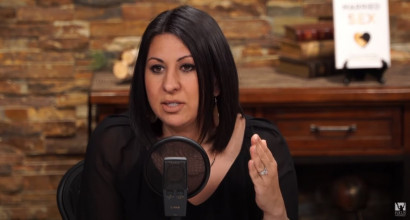John Fuller: This is Focus on the Family with Jim Daly. I’m John Fuller. And today we’re covering a delicate conversation topic. Uh, if you have younger listeners, get ’em occupied elsewhere, as we explore the physical, uh, intimacy that a couple can have in marriage. It’s a beautiful gift and Jim, I’m really looking forward to the continuation of the conversation with our guests.
Jim Daly: I would only add we’re talking about married couples.
John: Right.
Jim: (laughs) And so that’s important to us. You know, John, so often in this discussion, I mean, we giggle a little, we’re uneasy, it’s like walking on eggshells. But we in the Christian community need to embrace what God has done here. He has made something beautiful for us to celebrate in the context of marriage. It is a good thing and unfortunately, we fail to talk about it. And so what happens? The world takes it over, the world exploits it, uh, they twist it just like what the enemy of our soul will do. And for our household, and I’m talking about the wider Christian community, this is about getting our sexual appetites in order. Uh, it’s about us celebrating within the context of marriage, one another, husband and wife, and knowing what God meant when he said that two shall become one flesh. As we covered yesterday, this is deeply spiritual. This is something God intends for our joy and for our pleasure, uh, not to be mocked or kind of sullied by the world’s approach here.
John: Yeah.
Jim: This is a gift from God.
John: Yeah. And I’m so glad that, uh, Gary Thomas and Debra Fileta are back with us today to talk about their book, Married Sex: A Christian Couple’s Guide to Reimagining Your Love Life. It is a terrific resource. And, uh, Jim as I think you so had last time, every couple should have a copy of this.
Jim: (laughs) Yeah. Every couple should. Uh, welcome back both of you.
Debra Fileta: Thanks For having us.
Gary Thomas: Thank You.
Jim: Uh, Debra, I wanna start with you. Uh, I appreciate the fact in the book, you talked about your honeymoon, your wedding night, and I, I want to do a book. Maybe we could do this one together, a collection of terrible wedding night stories, which Jean and I have one as well. But right now I wanna ask about yours, not mine. (laughing)
Debra: Honeymoon bloopers. Wouldn’t that be something?
Jim: (laughing) Honeymoon Bloopers, we gotta do it.
Debra: You know, we, we have these expectations that sex is going to be magical on the honeymoon night and especially because many of us wait for sex. And, and we assume that just because we wait, it’s going to be great-
Jim: Perfect.
Debra: … right? But that is a wrong assumption because we don’t wait because of what it will do for our honeymoon, we wait because of what God is doing inside of us-
Jim: Yes.
Debra: … and the character he’s building inside of us through the waiting and the obedience. But going back to our honeymoon night, uh, let me just say our expectations were very wrong because getting part A into part B was a lot more complicated than we thought it would be. So we decide to use this ice hot lubricant, ended up being extremely excruciating-
Jim: Ooo.
Debra: … and we just laughed the entire night, ended up snuggling in bed, eating leftovers. And that was our honeymoon night. (laughs)
Jim: Okay. That example can go in 100 directions. I mean, the fact that you could laugh about it and snuggle and say, “Okay, we’ll try again tomorrow.”
Debra: Right.
Jim: That’s beautiful. It’s your honeymoon. It’s what should happen. What about the couple in that circumstance? I mean, where uh-oh, now we panic-
Debra: Right.
Jim: … and the guy is really upset.
Debra: I’ve worked with a couple just like that-
John: Hmm.
Debra: … where the honeymoon didn’t go as expected. The husband got really upset and stormed out of the room. I mean, talk about a disappointing wedding night for both of them and to go in with the expectations that it’s gonna be perfect and problem-free sets us up for major disappointment, but we’ve got these unhealthy and untrue expectations throughout the entirety of our marriage that come up in different parts of our sex life. And that’s why it’s important to get our expectations in a healthy place.
John: Yeah.
Jim: Let me, uh, for today, let me start with some of the brain science. I think that’s really intriguing. And for example, you state that men have two and a half times, (laughing) and this is like a duh to me, but men have two and a half times more brain space devoted to their sex drive than women. And all the women said, “Yep, that’s right.” Uh, but frankly, you know, I’m not surprised by that obviously. So how do we navigate that difference? And do you think God has a sense of humor in this? Is this why he did it? (laughing) He said, “Watch, this is gonna be really funny.”
John: Yeah. (laughing)
Jim: “I’m gonna give one of them two and a half times more capacity to think about it and the other one, two and a half times less and let’s see what happens.”
Gary: The wonderful thing I think about this is that God doesn’t use a cookie cutter to create men or women. We’re all different, but what I found so helpful and what we got into the brain science is that I find a lot of husbands approach their wives thinking, “This is what I would like, therefore, this is what she would like.”
John: Mm-hmm.
Gary: And the wives approach the husbands, “This is what I would like, therefore, this is what he would like.” Your spouse has a different brain and body than you do, whether it’s because of brain science or because his mother dropped him on his head when he was a year and a half.
Jim: (laughing) Let’s not go there.
Gary: The, the fact is they’re different than you. Different things create arousal, different things create satisfaction, different things create pleasure. Uh, one of the things that was surprising to me, and I’d been married over 30 years, is that a woman’s skin can be up to 10 times more sensitive than a man’s. And we wonder, why are women more into foreplay in general? Well, it feels better to them, but it also helps women understand why guys often say their touches are too light or women might say, “You know, your touch is too firm.” So it’s really for us a book about questions, more than answers. We present, this is how researchers say most men operate or the spectrum of where we lean so that you can say, “Is this true for you? Is this not true for you?” Because it’s difficult to talk about this. It’s almost universal. I don’t know that anything is universal, but this is close, that it’s easier to have sex than talk about it. (laughs) And, and so we have a section, Debra as a counselor just relates. Here’s some suggestions for when to bring it up, what to avoid, where to go. But to look at the whole book as conversations starters that couples can read through it together, pause and get to know each other because we really do believe that when you start to grow in this area, it feeds every aspect of your marriage. And it has benefits in so many different arenas of life.
Jim: Yeah. And Debra, I want to be cautious here because one of the feedback loops that we get here at Focus will be women that feel, uh, a certain amount of guilt because talking about this freedom in Christ, and this is what we should be enjoying. And they struggle. They deeply struggle with, with making that step and it, it doesn’t come with that great joy.
Debra: Right.
Jim: And we mentioned it a moment ago and I want to ask a little bit further here on that obligation feeling, because perhaps the brain wiring and their desires, chemically, it’s just not as high.
Debra: Right.
Jim: And so their husband’s thinking about it more often, maybe probing, saying, “Hey, is tonight gonna be a good night for us?” And she, “Yeah, yeah. Fine. Okay.” It’s that kind of reaction? How does she, um, get over that difficulty of embracing it for something that is good and not something that is bad? I mean, this is the million-dollar question right here.
Debra: Yeah. Yeah.
Jim: And how do men become more sensitive? I don’t wanna let us off the hook to where we understand that, that if she’s just not thinking the way we’re thinking. Like I said a moment ago fine, you know, I love dessert. I mean, I’m never too tired. Um, so how, how do we manage that together and how can we encourage our wives to, “Yeah. Whatever. Okay.”
Debra: Yeah. You know, first and foremost, I think women need to really understand that it shouldn’t be the norm to have that type of reaction towards sex. I think sometimes culture makes it seem like that’s the norm. You know, even comic strips or comedies on TV, they make it seem like it’s always that reaction of, “Oh no, thanks. I have a headache tonight. I don’t really feel like it.” That shouldn’t be the norm. And that’s not God’s intention for intimacy in marriage. So if that’s the norm in your life, I think the next question is, why? What is going on underneath the surface that might be preventing you from seeing sex as a gift for you to be enjoyed? Could it be a hormone imbalance? Could it be problems in the relationship that are going unaddressed, a lack of emotional and spiritual intimacy? Could it be that you’re not saying what you need and speaking up about those things? Could it be that your schedule is so busy and stressed out and you’re so exhausted by the end of the night? I want women to really begin to reframe this conversation and see sex as a gift for them. Maybe it’s not mutually pleasurable, and part of the next steps means sharing with my spouse what I need to make it mutually pleasurable. And conversations about these type of things are what help us to get there. You know, the average couple isn’t comfortable talking about sex. I bet you, the majority of people listening are even cringing a little because this is not a conversation that we’re taught to have on a regular basis, but it should be. And let me assure you, the more that you talk about this, the more comfortable you’re going to be talking about it.
Jim: Absolutely.
Debra: The easier it becomes.
Jim: And I, I can’t say amen enough to that because I do think we give over so much territory to the enemy in this space, and then we don’t communicate well. I do want to come back on helping men better understand that. And Gary, you can take a swing at this as well, but I want to hear Debra’s thoughts first. Sometimes, again, the stereotype, we’re a little dense, I can’t read your mind, you gotta kind of tell me how I can help us here. For that husband and with all the counseling you do of couples, what is the roadmap for the husband to say, “Building emotional intimacy looks like this.” I mean, seriously, some of us don’t know.
Debra: Right.
Jim: We don’t know what that means to connect emotionally. Please, tell me the secret.
Debra: You know, think about emotional connection like a spider’s web. Every little string is building something bigger, is building something that’s gonna last. It’s building this connection that you’re weaving between you and your spouse. So everything from the affection that you give through your touch, the compliments and affirmation that you give through your words, the time that you offer her, the attention, the listening ear, the teamwork mentality, as you’re navigating and raising a family. All of these things build strings of emotional connection one to another. And I think your sex life should almost be a gauge for you men. When you feel like your sex life isn’t where it should be, you’ve gotta look at the emotional tank in your marriage and see, “Have I been fueling the emotional tank?”
Jim: Well, that’s good.
Debra: Because if it’s not full, your sex life is gonna suffer as well.
Jim: And women said, “Yes, that’s exactly right. And we’re at like a quarter tank or less.”
Debra: They said, if you wanna arouse with my body, you’ve gotta start by arousing my heart.
Jim: Wow. Okay. That is good. That is good stuff. Uh, Gary, let’s turn it to you. When we’re talking about husbands approaching their wives for that, you know, whatever. It’d be good to know some tricks that you’ve heard. I know that, like Ted Cunningham, who we’ve had on the broadcast, they like candles. Now, I think my house would burn down. You know, honey, here’s the lick candle, what are we saying? But there can be some mechanisms that a husband can use to probe that question. How, how should we as husbands’ kind of probe that sensitive area knowing that we could get rejected. And that’s tough. We need to talk about that too. When your wife is saying, “Nah, I don’t feel like it tonight,” and that happens the next night and the next night, but what-
Gary: Yeah.
Jim: What do we do?
Gary: There’re two things I’d say to husbands, two different areas. One, for emotional attachment empathy will go a long way that you care about your wife’s wellbeing in all areas.
Jim: What does that sound like in that exchange?
Gary: Yeah. When-
Jim: What does the husband say?
Gary: When she’s presenting a problem, you’re not just trying to fix it-
John: Mm-hmm.
Gary: … rather you’re trying to say, “Boy, that’s difficult. I understand.” And then active listening would be a second part of it, “Tell me more,” instead of just, “gimme the Reader’s Digest version. Try not to make it too painful.” Be curious.
Jim: You’re crushing me right now. You’re killing me. (laughing)
Gary: Tell me more. And so the, the… Really the third aspect, “We’re in this life together.”
Jim: Yeah.
Gary: “If you’re too busy, it hurts me. If you feel like you’ve got too much on your plate, I wanna help take something off. Not that I’m adding another burden to you, but we’re doing life together.” So you’re creating this unified response too often in discussions on marital intimacy. We’re pitting husbands against wives and we’re exacerbating the battle rather than saying, “We wanna be in this together.” But the second part of that, I think, comes to focus on mutual pleasure. Understanding we, we have this whole chapter. It’s in the Song of Songs on the five senses, the way that we can make it more special by looking at each of the senses. It’s amazing to me and I… This was new for me, just getting into the Song of Songs, how being more thoughtful about, you know, guys are so focused on sight, but the power of sound, smell, taste, and touch and emphasizing it so that if our wife’s pleasure comes first, she’s more likely to want to go back the next time because she knows there’s a, frankly, a big payoff for her-
Jim: Yeah.
Gary: … if she becomes open to the idea.
Jim: Uh-huh.
Gary: So I, I think empathy and kindness, mutual pleasure, focusing on her being satisfied, s- s- sets you up for what goes forward.
Jim: I’m laughing, ’cause in that context, I mean Jean and I just had this conversation ’cause she, when we’re sitting in the morning, talking, having coffee together, connecting-
Debra: Mm-hmm.
Jim: … which is good, right?
Debra: Yeah.
Jim: You’re all giving me an A right now. But the other day she’ll often start with the situation. She’s down the line of the story. I don’t have the context for what she’s talking about. And I’ll, I’ll say, “Can you gimme the banner then fill in the detail,” ’cause she starts with the detail. I’m going, “I don’t know who you’re talking about.” And she’ll, “Ah, well I was gonna give that to you at the end.” And I go, “Oh it helps me if we start there and then I can understand context.” But even that is, to your point, Gary, I’m not kind of just listening and biting my tongue and saying, “Okay, I can go, uh, items then dig now and understand the context later.” But for her she wanted that to be a little surprise, right?
Gary: Yeah.
Jim: That’s what you’re saying.
Gary: Well, yeah. Well I know a couple where I love it. They, they’re stereotypical. It’s not always this way, but she values emotional connection so that she can be physically intimate. He feels like he wants to be physically intimate before he can open up emotionally. It’s not true with every couple. That’s a stereotype. It’s often true. But rather than see those as waring against each other, they see it as two different barometers. If he notices a physical yearning, he says, “How do we get connected as a couple?” If she notices the emotional disconnect, “How do we get connected as a couple?” So rather than, “Well, you’ve gotta be physical so that I can be emotional,” she says, “I can’t be physical if we’re not emotionally connected.” And he says, “It’s difficult for me to be emotionally connected if we’re not physically connected.” Because they both value connection. Emotional attachment is what they both strive after; they see it as two different warning lights. We don’t want to let this go on too long and then deal with the underlying issues. That doesn’t mean, “Okay, we gotta have sex or we gotta have a deep talk right now.” It’s what’s happened? In their case it was, “Are we too busy? Have we not done the check-ins?” They like to do morning check-ins and then weekly check-ins. Um, Debra and her husband, John often do weekly check-ins as well. But but it’s looking at it rather than selfishly, “Okay. How can I get my need met?” It’s a barometer. “Okay. We’re not connecting as a couple. It’s not healthy that either of us are living long term with unfulfilled desires like this, so how do we get reconnected jointly?”
Jim: Hmm.
Gary: Not one against the other, but both and.
John: Well, we’re Talking about connection and intimacy across many realms of the marriage relationship today on Focus on the Family. Your host is Jim Daly. Our guests are Gary Thomas and Debra Fileta. They’ve written a book together called Married Sex: A Christian Couple’s Guide to Reimagining Your Love Life. Look for your copy at focusonthefamily.com/broadcast or call 1-800, the letter A, and the word FAMILY.
Jim: Let’s move into some of those common problems, uh, whi- which again is meant to be helpful so that you’re identifying with one of these. That would be the trigger to say, “Okay, I need to get the book, get in touch with focus, get ahold of a counselor.” And that’s our intention to move you along into a healthier continuum. That’s the goal for all of us. Um, let me go back to that disappointment. And maybe with the couples that you’re counseling with Debra, you can give us some insight here where, uh, it’s that regular pattern of husband probing, wife rejects. Husband probes, wife rejects. And that pattern goes on and, and there may be connection, physical connection, whatever that, you know, once a month or twice a month, but it’s more infrequent than what would probably be healthy. And everybody struggles with that number, right? I hear, “Get to that question, Jim. What’s a normal sex life look like?” And maybe you can weave that in. But the point of it is the rejection because, when that happens, men turn to anger and they, you know, don’t know how to manage that rejection perhaps. And they need to work on that. So just as a common problem right there, how do you manage not connecting and not taking that personally?
Debra: Yeah. So one of the number one problem spots that come up in marriage is a difference in desire. And oftentimes I’ll have each person in the marriage write down the number that they would like to have sex per week. So the husband writes down a number, the wife writes down a number and what’s interesting is most often the numbers aren’t that far apart, and so it begs the question more than how many times do we want to be having sex? The deeper question is why? Why is this the number of times I want to be intimate in my marriage and why are we not achieving this number? Let’s have that conversation.
Jim: That’s good.
Debra: Because that’s where we start.
Jim: Yeah.
Debra: And maybe the answer to that is we’re not emotionally connecting, and we need to work on that. Maybe the answer to that is, our schedules are just too full, and we don’t have the time. We’re not prioritizing it. For each couple, the why is going to look a little bit different, but in order to get on the same page, the why is the most important thing to ask. That’s the root that we have to get to in order to solve that problem. And what you’ll find, and one thing that we’ve seen in the research that we’ve done is that most couples want to have sex more than they are. They’re just not sure how to get there and they’re not having conversations about it.
Jim: No, that’s good. And it would indicate something is not quite as healthy as it needs to be. Anything you wanna add to that, Gary? I mean, stress is part of it. Work stress. You’ve kind of alluded to that for yourself.
Gary: O- one thing that’s helpful is just to understand the different ways our brains operate. And this isn’t a male female thing. This is just different brains. And researchers have used to different terms. One is responsive desire, and one is spontaneous desire. And as you’ve described yourself, Jim, you’re clearly spontaneous desire. You don’t need a reason. It doesn’t matter what’s going on in your life. It doesn’t matter if you’re tired. If the thought is there, you’re open for it, right?
Jim: Sure.
Gary: Um, responsive desire means somebody literally has to allow themselves to be in a wanted way, consent is paramount, physically stimulated before their brain desires more intimacy. And some people might recognize this. If it never really seems like a good idea, but maybe they decide just to, you know, be nice with their spouse or something. They get done and say, “Why don’t we do this every night?” It’s just responsive desire. Their brain doesn’t really kick into arousal until physical stimulation happens. Now, your brain, isn’t your fault. One brain isn’t better than the other. It’s just the person who has spontaneous desire can’t expect his or her spouse to not operate the way their brain operates, and they might initiate more, and they shouldn’t take it personally. Um, but the one who recognizes their responsive spouse says, “Okay. How do I guard against that immediate not now, but maybe?” Now, again, in context, you always have the right to say no, but you also realize the way that your brain operates, you might really desire it if things go along and so maybe can be a very healthy word in marriage. You can say, “Well, we can cuddle a little bit. We can kiss a little bit. Maybe something happens, maybe it doesn’t.” There needs to be a climate of, of safety and security in each other, respecting each other. But often it’s, it’s respecting that we’re making love to someone who has a different brain, a different pattern of arousal and celebrating that and appreciating that and figuring out how do we make that work to serve the relationship, not just my desires, but our mutual relationship to have a mutually pleasurable sexual experience.
Jim: Let’s hit some of those big themes that we haven’t been able to cover. And again, people, if this is, uh, touching a need in your own life, uh, get a copy of the book and we’ll give you the details to do that in just a minute. But those big themes, uh, Debra coming back to the idea that physical pleasure is good. It is good. God is okay with it. It’s not something to be shameful of, uh, but something to embrace. Take a swing at that one.
Debra: Yeah. You know, when you feel like your marriage is doing well emotionally and you’re at a good place, you know, I, I just think of the average couple who’s got kids and there’s so much going on in their life. And all of a sudden, the kids start becoming the forefront of everything that they do.
Jim: Kid-centric.
Debra: Kid-centric, marriage, and their, their intimacy and their sex life kind of takes a backseat, you know, those are the couples that we wanna focus on. We wanna remind them that when you prioritize one another, when you prioritize the intimacy in your marriage, when you prioritize your sex life, you’re actually helping your family because a connected mom and dad, a connected couple overflows good things into their children’s lives, into their family’s lives. When you’re filled up emotionally and sexually, it overflows into your ministry. It overflows into your life in, in so many ways. And so there’s a benefit and a blessing, and God knows this, you know, this was His plan. We’re not coming up with this stuff. Biblically speaking, God knows that a healthy sex life goes hand in hand with a healthy marriage.
Gary: Yeah. We had a couple that just was encouraging, where before they had kids, they would have these long-drawn-out sessions and they really remembered gourmet intimacy experiences. And then they were at a place where they had three or four kids. And she’s said, “You know, I feel like I’m being pawed all day and we’d… Look, okay, turn up the TV. We’ve got 10 minutes. Let’s just go take care of it.” She goes, “’Cause I just needed that release.” But after a while she said, “I realized it wasn’t serving our marriage.” There’s a place for quickies in marriage, but they like- likened it to fast food. You’re not hungry, but it’s not really nutritious. It’s not nurturing. And they realized, “We need to take a step back and create some of those gourmet experiences that we had just taken for granted.” And that’s what I love about the whole idea of married sex, the way that God designed it. There’s so many different forms. There’s a place for quickies. There’s a time for fun sex and sensuous sex, athletic sex or just those gourmet experiences. And it, they all serve the relationship in a different way. But taking a step back and just as you say, I, I, my wife, every day, have you gotten your seven servings of vegetables in? Has our relationship gotten our emotional connection in? Have we gotten our sexual connection in? Have we gotten our spiritual connection in? Recognizing what does our relationship need and recognizing that sex can be a big part of it, but not just sex, different kinds of sex that reaches each spouse in a different way.
Jim: And I think it brings us down and I love those summaries to this last question, and then we’re done and, uh, we can all breathe easier. (laughing) Uh, but again, this is awesome. I’m so grateful to you writing the book and being here with us but let me ask each of you to describe what the ultimate goal of a good and godly sex life is. And, uh, for example, you encourage husbands and wives to keep learning all they can throughout their lifetime, throughout their marriage to do this better and better. So kind of hone in on what we’re aiming for.
Debra: If I had to put it in one sentence, I would say that a healthy sex life is more about relationship than about release. And what does it look like to use sexual intimacy to build the relationship? When sexual intimacy is lacking, what does that tell me about the relationship and what we need to work on? So when we can keep that front and center, I think it’ll really help us in ha- navigating this conversation.
Jim: Hmm. Gary?
Gary: I mentioned this yesterday. I believe it’s mutually pleasurable. It’s personally affirming. I feel valued. I feel cherished. I feel closer to you. And I believe it’s spiritually energizing. It leads us closer to the God who created us and who created the act, who created marriage so that when we appreciate each other, we appreciate the fact that we’re created with bodies and we can enjoy each other and we can worship our God because of it. I think we’re going to a special place.
Jim: Well, this has good and very energizing, I believe. And I hope for you, the listener, the viewer, uh, this is a topic that you may not talk a lot about, but you need to. And I hope that, uh, Gary and Debra’s book can give you that guide to begin those discussions and, and really, uh, help you with the boundaries of that discussion. Uh, Married Sex: A Christian Couple’s Guide to Reimagining Your Love Life is an excellent resource. And I would encourage you to get it from Focus on the Family. And if you can make a gift, a monthly gift is great. It helps us with our budgeting or a onetime gift, we will send it to you as our way of saying thank you.
John: Yeah, if you’ve benefited from the ministry of Focus on the Family generally, or this, uh, conversation with Debra and Gary specifically, we invite you to contribute to the work of the ministry. Uh, donate today, request your copy of that book, and, uh, we can connect you with a counselor as well. We’ve alluded to that, uh, during the course of the discussion. Our phone number is 800, the letter A, and the word FAMILY, or stop by focusonthefamily.com/broadcast.
Jim: Debra and Gary, thank you so much for being with us. This has been really good.
Debra: Thanks for having us.
Gary: Thank you, Jim.
John: And we hope that you as a listener, have a great weekend with your family and with your church family as well. And then please join us on Monday for insights on showing unconditional love in your marriage.
Preview:
Bob Lepine: Fill yourself up with God’s love for you, get God’s perspective of his love for your spouse, and then let God’s love for you poured into you, spill out onto your spouse, and now you’ve got a whole different love source for your marriage.
End of Preview
























